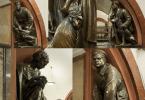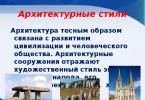Average activity in class, answers are incomplete, without using historical data. terms
completion of all tasks, both oral and written, according to the schemes

- The Athenians came up with the best device - democracy. All people were equal, and everyone could express themselves if they wanted and had the ability. And during the time of Pericles, Athens became the most powerful democratic city in Greece.
- Did you know that about a third of the Athenian population were slaves? “A slave is animate property and the most perfect of all instruments.”
- Compare the opinions of Antoshka and the scientists. What contradiction is observed?
- What is the question? Compare it with the author's.

YOUR FORMULATION OF THE PROBLEM MAY NOT COICH THE AUTHOR'S. PLEASE CHOOSE THE FORMULATION IN CLASS THAT IS MOST INTERESTING TO YOU!

Athenian democracy under Pericles
Drawing – “New Soldier” magazine No. 83

1. SLAVE ECONOMY
2. LEADER OF THE PEOPLE
3. ATHENIAN DEMOCRACY

LET'S REMEMBER WHAT WE KNOW
Required level. Select statements in the table that relate to the concept of “democracy” and mark them with a “+” sign.
Increased level. Write down in the table the facts from the history of Ancient Greece that correspond to each correct statement.
Policy- is a city-state, a community of free full citizens who have the right to participate in its management.
A method of governing a state in which all major issues of power are decided by a majority vote of citizens is called aristocracy .
Slave- This is a person deprived of freedom.
In ancient Greek city policies citizens had no right to participate in the government of their state.
To complete the task, you must use the built-in Microsoft PPT tools in view mode (PEN tool)

SLAVE ECONOMY
Guess what the well-being of the artisan’s family rests on.
The animation is set to click. The job fades and the picture appears (page 168). The task is completed in viewing mode using the built-in Microsoft PPT tools
In the house of an Athenian potter-painter

SLAVE ECONOMY
Increased level. Determine what benefits the use of slave labor gave the Greeks.
Argument(s)
I believe that _______
But in other way, ________________
because_________
__________________,
because________
__________________
__________________ ________________
________________
________________ __________________

ATHENS DEMOCRACY
Required level. Write down the signs of Athenian democracy in the table.
Increased level. In the blank space of the table, write down the evidence that Athens in the 5th century B.C. were a slave-owning democracy
Maximum level: draw a conclusion
Signs of Athenian democracy
_________________
Evidence of democracy
_________________
_________________________
slave owners
_________________
_________________________
_________________________

LEADER OF THE PEOPLE
using paragraph 40, paragraphs 1 and 2, make up 3 questions for each paragraph.
____________________________
____________________________
____________________________
____________________________
____________________________
Ancient bust

LEADER OF THE PEOPLE
Why is the reign of Pericles considered the heyday of Athenian democracy?
____________________________
____________________________ ____________________________
____________________________
____________________________
____________________________
____________________________
Ancient bust

LEADER OF THE PEOPLE
Required level. Place events and phenomena in the correct sequence.
1. Now anyone - both rich and poor - could be elected one of the officials.
2. Participation in the national assembly and service in elected positions were paid from the treasury of the policy.
3. After victories in the Greco-Persian Wars, more than 150 thousand prisoners of war were sold into slavery in the markets of Hellas.

LEADER OF THE PEOPLE
Increased level. What process is represented here: the decline or the rise of Athenian democracy under Pericles? Write one piece of evidence for your statement in the table. Provide one or two pieces of evidence for your point of view.
Maximum level. Write down two or three proofs of your statement in the table.
Argument(s)
I believe that _____________________
because________________________
________________________________,
_________________________________

- Paragraph 40, questions orally.
- Prepare for different level testing

Compare Athenian democracy under Solon and under Pericles. Present your answer in the form of a table.
general
differences
Democracy under Solon
Democracy under Pericles

DISCOVERING NEW KNOWLEDGE
DURING THE TIME OF PERICLES, ATHENS BECAME THE MOST POWERFUL AND DEMOCRATIC POLIS IN GREECE.

LESSON PROBLEM
WHY DID FREE GREEKS USE THE LABOR OF SLAVES?
The animation is set to click. The question disappears, the author’s formulation of the problem situation appears

SLAVE ECONOMY
What do you, a person of the 21st century, think: can various benefits justify the use of slave labor? Explain your answer.
Increased level. Write down two or three arguments or consider this historical phenomenon from different positions, confirming each with an argument.
Maximum level. Complete the task at an advanced level, but use additional information not covered in class.
Argument(s)
I believe that _______
because_________
But in other way, ________________,
_________________,
because________
__________________
__________________ _________________________________
________________
________________ ________________________________
The animation is set to click. The task fades and the table appears.

completion of all tasks, both oral and written according to the schemes, active work in the lesson, reasoned answers using historical terms
completion of all tasks, both oral and written according to the schemes, 1 oral response in class
completion of all tasks, both oral and written, according to the schemes
Democracy is a unique feature of ancient Greek civilization, which reached its greatest flourishing in Athens, one of the most powerful policies of Ancient Greece. And the era of Pericles is called by historians the “Golden Age” of democracy: it was during the period of his activity that the concept of democracy was filled with real content. Many historians are still convinced that by studying the Athenian democracy of the time of Pericles, important lessons can be learned for modern politicians.
Explain why the period of Pericles' reign is called the "heyday of Athenian democracy."


The leader of the Athenian democracy Pericles 1. The leader of the Athenian democracy Pericles After the Greco-Persian wars, Athens began to flourish. Pericles was at their head at that time. In 443 BC. e. The Athenians elected him for the first time to the highest position in their polis. He was then re-elected 15 more times. Historians say that Pericles was an outstanding statesman and patriot. He (was famous as a wonderful speaker. Eloquence (the ability to speak correctly and convincingly) was a very important quality for a politician. After all, there were no newspapers, radio, or television at that time. To achieve success, it was necessary to convince the people's assembly that one was right. For the power of words, contemporaries They called Pericles the Olympian, comparing him with Zeus. Pericles devoted all his strength and all his time to caring for Athens and its citizens. He was honest and selfless. “Although he made the city... the greatest and richest, although he surpassed many kings and tyrants in power ... wrote the master Plutarch, he did not increase his fortune by a single drachma (drachma is an Athenian coin) compared to what his father Pericles left him, made several changes to the administration of the polis, to the rights of citizens, thereby continuing the reforms of Solon and Cleisthenes Under Pericles, democracy finally emerged in Athens.


2. People's Assembly. The main body of government was the people's assembly. All citizens took part in it. A citizen was considered a man who had reached the age of 20 and whose mother and father were both Athenians. The people's assembly met 34 times a month and usually took place in the city center on Pnyx Hill. At the meeting, all the main issues of the life of the city-state were decided and new laws were adopted.


Any citizen had the right to express his opinion on the issue under discussion. One contemporary wrote: “Everyone, standing up, gives advice, be it a carpenter, coppersmith, shoemaker, merchant, shipowner, rich, poor, noble, rootless.”



3. Officials. The People's Assembly elected numerous officials of the polis (we could call them officials). After a year they reported to the meeting. Those who performed poorly were punished, most often they paid a fine. Officials dealt with various issues: they monitored the flow of money into the treasury, compliance with laws and rules of trade in the market, cleanliness on the streets, etc.

4. Court The court played a large role in the life of Athens. All citizens over 30 years of age could participate in its work. 6 thousand judges were elected annually, but they usually did not all sit together. Separate commissions were created for different cases. The judges did not know in advance which commission they would sit on. This eliminated the possibility of bribery.

5. Introduction of payment Participation in government required citizens to spend a lot of time. Not all Athenians could come to meetings of the national assembly and court, or be officials. The poor had to work constantly: peasants cultivate their land, artisans work in their workshops. Every time the question arose for them: should they go to a meeting today or earn money for a living? Pericles thought this was wrong. He wanted even the poorest citizens to participate in government, and he found a way to achieve this.

As ancient authors say, at his suggestion the state began to pay judges. When they met, they received enough money to live for one day. Then they introduced payment for some positions. Later they began to pay those who came to the meeting of the national assembly. Thanks to this, even the poorest citizens had a real opportunity to participate in government. Pericles also achieved the establishment of pensions for orphans and disabled people.

In no other Greek state did the people have as many rights as in Athens. But these were minority rights. In total, approximately 200 thousand people lived in Attica, but there were only 3040 thousand citizens. Women citizens could not participate in government. To the ancient Greeks, the idea that a woman could come to a national assembly seemed simply ridiculous. Free people who moved to Athens from other cities, much less slaves, had no political rights.

6. Construction in Athens under Pericles. Pericles did not want ordinary citizens to turn into beggars living at the expense of the state. Therefore, at his suggestion, temples, public buildings, and fortifications were built in the city. Athens has become the most beautiful city in Greece. Construction provided jobs to many citizens. People of various professions, from loaders and donkey drivers to skilled sculptors and architects, were employed at construction sites. The Athenians mastered new types of craft. Gradually, many of them became good specialists.


7. Military strength of Athens Pericles did a lot to strengthen the power of his city. He saw the main strength of Athens in the fleet. Every year for eight months the fleet sailed throughout the Mediterranean Sea. The sailors were also paid money at this time. The Athenian fleet destroyed the pirates. The time has come for the heyday of maritime trade. The Athens port of Piraeus has become a major trade center. Sometimes up to 400 ships gathered here. The Athenians had great benefits from trade.


8. Slaves. A significant part of the inhabitants of Athens were slaves. “Everyone has slaves,” argued one of the writers. “We are free, because we live by the labor of slaves,” echoed the famous speaker. Slaves worked in the fields, in workshops, and in citizens' homes. The biggest use of slaves was in the silver mines, where they worked day and night. The main source of slaves was war. Many slaves were already born in the master's house. There were few Greeks among the slaves, because those captured were usually ransomed by relatives. Slaves were mainly brought from other countries of Thrace, the Northern Black Sea region and Asia Minor. There were several famous slave markets in Greece. On the first day of each month, slaves were traded in the Athenian agora. The slave climbed onto the platform, and the herald praised his virtues in order to increase the price. The slave had absolutely no rights. He had neither property nor family. They did not see him as a person, he was called a talking instrument. Sometimes slaves ran away from their owners. Those caught were beaten with whips and the inscription was burned on their foreheads: “Hold me. I’m running away.” The death of Socrates was the last and most revealing, his most brilliant philosophical work, which caused deep fermentation of minds and a powerful public resonance throughout many centuries of human history. The young student of Socrates, Plato, who was present at the trial, experienced such a strong moral shock that he became seriously ill. "How to live further in a society that punishes wisdom?" - this is the question that confronted Plato in all its drama and which gave rise to another question: “What should a society be like that is built in full accordance with wisdom?” Thus was born the first philosophical utopia about a “fair” (for its time) social system, which subsequently had a great influence on the emergence and development of utopian socialism





Reforms of Solon 594 BC e. Greco-Persian wars BC. e. Rise of Athens under Pericles 443 BC. e.


People's Assembly The power of the people Strategist - Pericles Passes laws Decides to start a war and sign peace Conducts elections of a strategist and other responsible positions Manages the treasury Promotes the implementation of laws Manages the defense of the city Reports to the people's assembly on the implementation of assigned tasks and the use of public funds




Pericles - orator Once the Spartan king asked the famous wrestler who was stronger - he or Pericles. He replied: “Even if I put Pericles on both shoulders, then even then he will prove that I am defeated, and the people will believe him!” What qualities of Pericles does this indicate? Who is a speaker? A speaker is a person who knows how to make speeches and convince listeners





Democracy under Pericles reached its peak. This is evidenced by: The decisive role in governing the country passed to the People's Assembly and the Council of Five Hundred. Under Pericles, many government positions existed. Government positions other than strategists could be filled by drawing lots. Thanks to Pericles, those who were involved in politics began to receive salaries. Without paying judges, the court would end up in the hands of the rich alone. Now the poor citizens of Athens were also able to participate in the government of the state. Pericles was elected 15 times by the People's Assembly as the first strategist. Citizens trusted him. The decisive role in governing the country passed to the People's Assembly and the Council of Five Hundred. Under Pericles, many government positions existed. Government positions other than strategists could be filled by drawing lots. Thanks to Pericles, those who were involved in politics began to receive salaries. Without paying judges, the court would end up in the hands of the rich alone. Now the poor citizens of Athens were also able to participate in the government of the state. Pericles was elected 15 times by the People's Assembly as the first strategist. Citizens trusted him.


Complete tasks 3. Match the names or name and activity, description Names, title Activities, description 1) Sophocles A) The first strategist, under whom Athens experienced its heyday 2) Parthenon 3) Pericles 4) Myron B) temple in Athens, dedicated to the patroness of the city C) the sculptor who created the statue of the discus thrower D) the author of the tragedy "Antigone"

 2. Pay for the performance of official duties 5. Accountability of officials 8. Elected positions 9. Equality of citizens 3. Power of the people 1. Citizens are a minority 4. Women did not participate in the government of Athens 7. Laws protected only citizens 6. Drawing lots for voting (position may take the unworthy)
2. Pay for the performance of official duties 5. Accountability of officials 8. Elected positions 9. Equality of citizens 3. Power of the people 1. Citizens are a minority 4. Women did not participate in the government of Athens 7. Laws protected only citizens 6. Drawing lots for voting (position may take the unworthy)

Pericles was an outstanding statesman and patriot. He devoted all his energy and time to caring for Athens and its citizens. He was honest and unselfish. He was famous as a wonderful speaker (he had eloquence - the art of speaking correctly and convincingly).




After the discussion, citizens voted. They threw a white pebble for the proposed solution, and a black one against it. The People's Assembly elected numerous officials of the policy: after a year they reported to the assembly. Those who performed poorly were punished: they had to pay a fine.



The court played a big role. All citizens over 30 years of age could take part in its work. 6,000 judges were elected annually, but they did not all sit together. The judges voted using tokens. A token with a hole meant that the person was guilty, and a token without a hole meant that the person was innocent.

In no other Greek city did the people have as many rights as in Athens. But these were minority rights. In total, approximately 200 thousand people lived in Attica, but there were only thousands of citizens. Women could not participate in management (this was unacceptable). Slaves, as well as free people from other policies, had no rights.






A significant part of the inhabitants of Athens were slaves. They worked in the fields, in workshops, and in citizens' homes. The biggest use of slaves was in the silver mines, where they worked day and night. They worked in the fields, in workshops, and in citizens' homes. The biggest use of slaves was in the silver mines, where they worked day and night.

War. The main source of slaves was war. from other countries Slaves were mainly brought from other countries - Thrace, the Northern Black Sea region and Asia Minor. There were several famous slave markets in Greece. On the first day of each month, slaves were traded in the Athenian agora. The slave climbed onto the platform, and the herald praised his virtues in order to increase the price.


Conclusions During the time of Pericles, Athens was the most powerful state of Hellas, its cultural center. During the time of Pericles, Athens was the most powerful state of Hellas, its cultural center. During the time of Pericles, democracy flourished in Athens.During the time of Pericles, democracy flourished in Athens.





